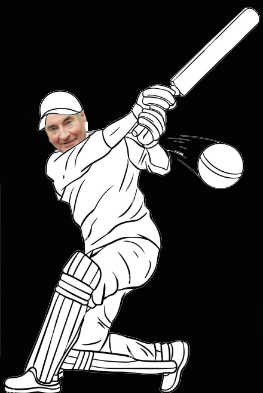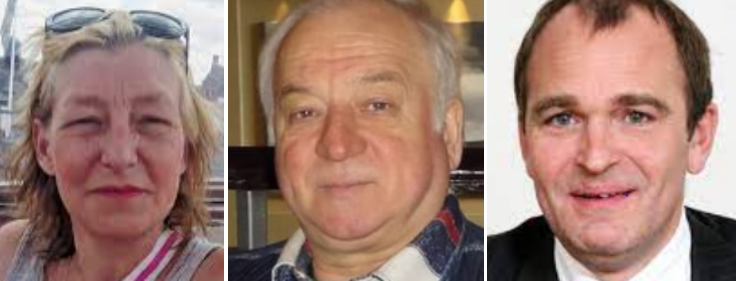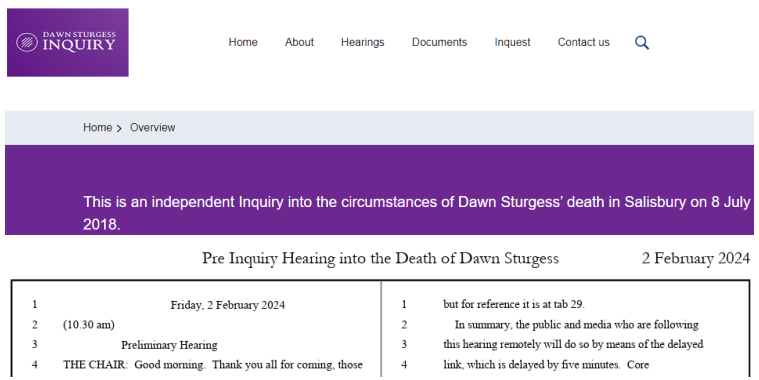

by John Helmer, Moscow
@bears_with
In a London courtroom on Friday, Lord Anthony Hughes (lead image), the retired judge whom the British government has appointed to run a public inquiry into the alleged Novichok poisonings of March and June 2018, collapsed into a farce of state secrecy.
Not even the open hearings which are now scheduled to start later this year, on October 14, will in fact be open, Hughes told lawyers for the Home Office and for the family of Dawn Sturgess. This is because the police and the security services have told the judge they want a livestream default or broadcasting delay of at least fifteen minutes, possibly longer when “the police will decide if any disclosure at all will be made”, a government lawyer told the judge.
Hughes announced: “I absolutely accept how difficult it is when you are batting in the dark…but it is a situation which has simply got to be coped with.”
Follow the archive on the official investigation of the cause of Dawn Sturgess’s death in June 2018, allegedly from a Novichok poison which Russian assassins left behind after they had attacked Sergei and Yulia Skripal the previous March.

Left to right: Dawn Sturgess, died between June 30 and July 8, 2018; Sergei Skripal, died in British custody at an unknown date after his last telephone call to Russia on June 19, 2019; Adam Chapman, the London lawyer appointed by the British government on March 25, 2022 -- without evidence of Skripal consent.
The Skripals have been assigned a lawyer, Adam Chapman, to represent them in the Hughes proceeding, but he wasn’t present in court on Friday. To date, Chapman hasn’t asked a question, made a written submission, or reported what the Skripals want to say about the Novichok affair. Chapman’s silence confirms that if the Skripals are still alive, they are being held by the British government incommunicado. Hughes has yet to rule on whether they will be called to testify as witnesses, and if so, whether their testimony will be given in open or secret session.
Read the book of the Skripal case here.
Hughes ran Friday’s hearing to just under 90 minutes. A switch of stream engineering companies and a failure by Paul Dunlay, the judge’s technician in charge of live-streaming, excluded reporters who had registered to hear the proceeding from their offices. Hughes’s spokesman apologized for the “confusion”. Dunlay said “we are not responsible for your IT systems security which may have blocked this auto response.”
A transcript of the proceeding was later published on the inquiry’s website.

Source: https://www.dawnsturgess.independent-inquiry.uk/
“My starting point,” Hughes claimed, “has always been that this is a public hearing and everything is in public unless there is a necessity for it not to be. But given the circumstances of this Inquiry – involving as it does the use of a chemical weapon on British soil – it will be of no surprise that there will inevitably be some material that will be CLOSED. Indeed that was the reason for the conversion of the original Inquest to a public Inquiry.”
Just how little will be open — and just how large “the necessity for it not to be” — were revealed in Friday’s hearing.
Closed circuit television (CCTV) tapes from Salisbury and Amesbury which the police seized after the Skripal attack and the Sturgess death, and which have not been released to date, are to be allowed in evidence in the open hearing, but only, Judge Hughes has conceded, in the form of a “compilation”. What has been withheld will remain a state secret.
A police report combining the Skripal incident in Salisbury of March 4, 2018, and the Sturgess incident in Amesbury four months later, on June 30, 2018, has been partially released to the Sturgess family’s lawyers, led by Michael Mansfield KC. But on Friday he told Hughes the evidential value of the report has already been compromised.
“There are 17 pages of redactions,” Mansfield said, “not all of them total pages, although the further you go into the report, starting at page, for example — it should be the same on yours, so that is page 53 onwards. There is nothing visible there, or the 20 succeeding pages. Altogether 17 pages in which, again, if we can just say, there must be questions arising there and in relation to the open and closed divide, it would be of great help if we did have a gist.”
Mansfield went on to refer to a section he has read in the police report entitled “Target”. “I hope I am not exaggerating it, there are some pretty astonishing observations in this section alone and if what is said in this section alone about the target, there is and must be very much more material, or absence of material.”
Mansfield was intimating in public that the police report he has seen is missing the key elements of how the alleged Russian-made Novichok got into Dawn Sturgess’s hands and killed her, as well as the police account of how their searches of Sturgess’s house failed to detect the Novichok in a perfume bottle standing on the kitchen table until July 11, 2018 – eleven days after Sturgess had collapsed and been taken to Salisbury District Hospital, and after police reported their search of the house for suspected narcotics.
“The issues that the family may want to raise,” Mansfield said, “preventability [of Novichok entering the UK] being one of them, but there are many others and obviously I will exemplify what some of the others may be, to do with Novichok, movements, other parties and so on, the list is quite extensive already in terms of issues.” Mansfield was implying that the police report he has seen doesn’t reveal how the Novichok reached the Skripals in Salisbury, and then later Sturgess and her boyfriend, at their home in Amesbury. The lawyer is also hinting that the police report isn’t clear on the evidence that “other parties” – the alleged Russian assassins – attacked the Skripals, then abandoned a leftover bottle of the poison for Sturgess’s boyfriend to find and present as a gift to her.
“In terms of tying those issues in with material,” Mansfield told Hughes, “we cannot do much more than look at the police report as it stands and hopefully there will be other documents being disclosed after April 19, which will assist. However, the point I am coming to is this, that the analysis of the material we get after the 19th is going to be fundamental.”
“The internal question –” Mansfield continued, “can I raise one question, and that is the location of Novichok in Salisbury itself and the police report — I am not going to read it out — has in fact pinpointed some dimensions that were not known before. That is just on the preliminary police report. So the actual locations and deployment of Novichok, the nature of Novichok, the link between Salisbury and Amesbury, is again a separate topic.”
“Separate topic” is Mansfield’s euphemism for what has not been revealed by the British police and security services after almost six years of investigation – that is to say, evidence about Novichok either still missing or concealed in the redacted pages of the police report.
Hughes allowed a guarded mention of the foreign intelligence he has been reading in the evidence presented by the security services, but which is likely to be kept secret from the public. The Home Office lawyer told Hughes that foreign intelligence is to be called by the euphemism — “information derived from international partners. According to the terms under which such information is shared, Op Verbasco [police] must obtain permission for their international partners before such material is disclosed. Permission remains outstanding in respect of some of the material.” This means that US signals and other intelligence has yet to be permitted for disclosure by the British police; for testing by cross-examination in court; and definitely not for the public if Washington vetoes disclosure.
For the time being, this intelligence is being held by Hughes’s assistants “in a secure location”. “I understand,” Hughes agreed, “that it may have to be handled in a particular way.”
The witnesses to testify at the open inquiry have also been tampered with. At present, Hughes was told, the list of these witnesses remains secret, and even the list of ciphers by which secret witness testimony will be identified. On Friday the judge agreed to postpone to another preliminary hearing — behind closed doors — a review of the witness names and ciphers.
Mansfield for the Sturgess family told Hughes the outcome is likely to be ludicrous. “Just trying to approach it practically speaking, one doesn’t want a situation in which in the middle of a witness you ask a question to discover it cannot be answered, and many of these witnesses overlap Amesbury and Salisbury, so again, it cannot be compartmentalised. So the issue about what can be heard publicly and what cannot be heard, that also has to be at least canvassed in a round table forum…”
Hughes acknowledged that the requirements to keep secret and close the open hearing have become so complicated and time-consuming, much more money will be needed from the Home Office budget. In its last financial report, the Inquiry revealed that Hughes has so far received salary and expenses of just under of £22,000. The big beneficiaries have been the lawyers assisting the judge – they have earned £946,340, with another half-million pounds on “staffing costs”.
The problems of vetting the evidence to keep it secret has become so protracted and “complicated”, Hughes announced that the government will have to give him and his lawyers more cash. “I will just say this, you and Ms McGahey [Home Office lawyer] have been very tactfully making what I will call the resources submission to me over the course of the last two years now. If in the end this comes down to resources, we have reached the point at which additional ones are going to have to be provided.”
As soon as money was mentioned in the courtroom, Mansfield stood up to say he wants more of it too. “Given what is being said about resources and all the rest, may we say on that topic, we have earmarked that at a much earlier stage, suggesting that the government in fact provides sufficient resources.” Hughes replied: “No, you need not worry about resources, Mr Mansfield. What you said in the past has been noted and understood but there are — it is much more complicated…than simply numbers.”
Complicated — that’s Hughes’s innuendo for the objective of the Sturgess family, through Mansfield, to obtain a multi-million pound payoff from the government in compensation for what Mansfield alleges was the negligence of the security services to stop the Novichok and the Russians from getting into the UK in the first place. This, the so-called preventability issue, is the reason the Home Office is paying Hughes and his staff to conclude at the end of the inquiry that there was no fault, no negligence.
The next preliminary hearing has been scheduled for March 15.











Leave a Reply